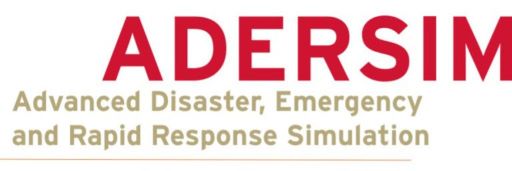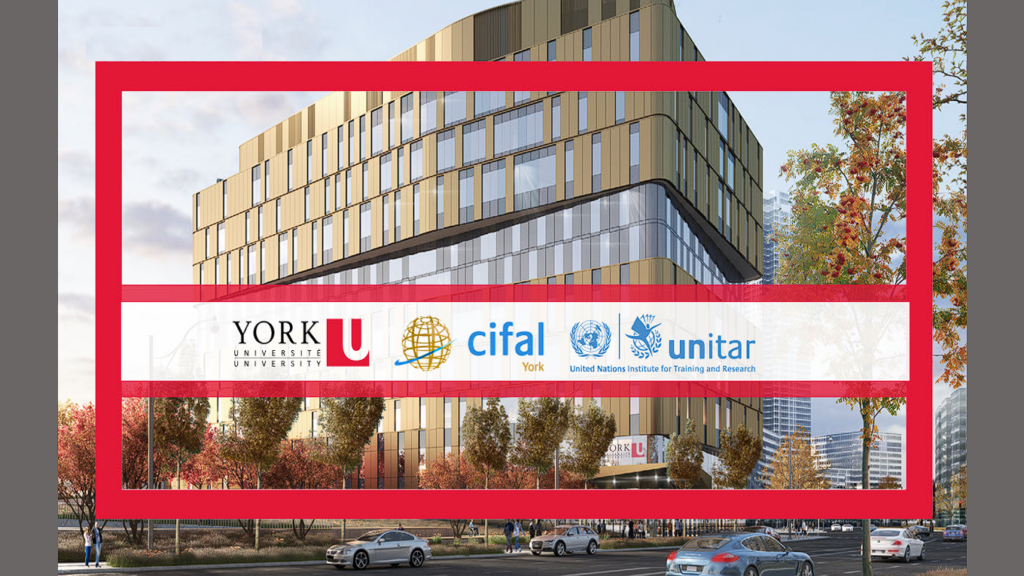


Date & Time
- DATES: OCT 17 | NOV 21 | DEC 19 | JAN 16 | FEB 20 | MAR 20 | APR 17 | MAY 15 | JUN 19 | JUL 17 | AUG 21
- Time: 12:00 PM - 1:00 PM EDT/EST
- Location: VIRTUAL (ZOOM WEBINAR)
Register
Participants attending a minimum of 50% of sessions will receive a certificate of attendance from CIFAL York
BACKGROUND
The use of drones and remotely piloted aircraft systems (RPAS) has revolutionized numerous sectors, offering unparalleled advantages in mapping, monitoring, efficiency, safety, and accessibility. In the realms of public health and safety, Risk and emergency management, and humanitarian response, these technologies have become invaluable tools that enhance our capabilities to save lives, respond to crises, and improve public well-being. While the drones have greatly improved the capacities and capabilities of these sectors, the adoption of these technologies by industries and the public sector has been limited. This speaker series aims to increase the visibility of these technologies and enhance participants’ knowledge to promote best practices and innovation while building capacity and fostering collaboration to maximize the positive impact of drones in public health, Public Safety, Emergency Management and Humanitarian Response.
GOALS AND OBJECTIVES
The main learning objectives of this speaker series are:
- Gain knowledge about the role of drones and RPAS in Public Health/ Risk and Emergency Management/ Public Safety/ Humanitarian Response.
- Increase awareness among First Nations communities about the benefits and applications of drones and RPAS in Public Health/ Risk and Emergency Management/ Public Safety/ Humanitarian Response.
- Provide insights on how to effectively use drones for mapping, monitoring, and responding to emergencies in First Nations communities.
- Understand different types of drones and their use and users needs in Public Health/ Risk and Emergency Management/ Public Safety/ Humanitarian Response.
- Appreciate legal and ethical aspects of drones use in Public Health/ Risk and Emergency Management/ Public Safety/ Humanitarian Response.
- Promote best practices for using drones in Public Health/ Risk and Emergency Management/ Public Safety/ Humanitarian Response.
- Understand and assess major challenges and requirements for using drones in Disaster Risk/ Emergency Management/ Public Safety/ Humanitarian Response.
- Learn how to use drone generated data for rapid and effective Public Health/ Risk and Emergency Management/ Public Safety/ Humanitarian Response analysis, operations, and assessments.
- Foster collaboration between speakers and participants in the fields of Public Health/ Risk and Emergency Management/ Public Safety/ Humanitarian Response.
- Provide participants with insights on how to integrate drone technology into their operations.
- Create a platform to inspire innovative uses for drone and RPAS technologies in the fields of Public Health/ Risk and Emergency Management/ Public Safety/ Humanitarian Response
TARGET AUDIENCES
- Public Health Departments
- Emergency Management Agencies
- Law Enforcement and Public Safety Professionals
- Aviation Regulatory Authorities
- Healthcare and Medical Professionals
- Medical Supply Companies
- Health & Safety Professionals
- International Organizations (WHO, UNICEF, etc.)
- Search and Rescue Professionals
- Humanitarian NGOs and NGOs in related sectors
- Public Policy Researchers and Professionals
- Professors and Students in related fields
- Drone Pilots and Professionals
- First Response Organizations
- Fire Departments
SESSION 1 THURSDAY OCTOBER 17 12:00PM-1:00PM (EDT)

Moderator: Mishal Arif
Technologist, Centre for Innovation and Research in Unmanned Systems (CIRUS), Southern Alberta Institute of Technology (SAIT)

Speaker: Stephanie Lapointe
Operations Manager & Flight Instructor, Centre for Innovation and Research in Unmanned Systems (CIRUS), Applied Research and Innovation Services (ARIS), Southern Alberta Institute of Technology (SAIT)
Topic: Remotely Piloted Aircraft Systems (RPAS) Laws and Regulations for Disaster Management
SESSION 2 THURSDAY NOVEMBER 21 12:00PM-1:00PM (EST)

Moderator: Mishal Arif
Technologist, Centre for Innovation and Research in Unmanned Systems (CIRUS), Southern Alberta Institute of Technology (SAIT)

Speaker: Cliffton Cross
Council Member, Frog Lake First Nations
Topic: Connecting Frog Lake First Nation: Innovative Applications of Drone Technology
SESSION 3 THURSDAY DECEMBER 19 12:00PM-1:00PM (EDT)

Moderator: Mishal Arif
Technologist, Centre for Innovation and Research in Unmanned Systems (CIRUS), Southern Alberta Institute of Technology (SAIT)

Speaker: Reg Fountain
MA DEM, CEM; Director, Operations & Emergency Management, ÎIyârhe Nakoda Nation
Topic: Drone Support to Emergency Management on the Stoney Nakoda Nation
SESSION 4 THURSDAY JANUARY 16 12:00PM-1:00PM (EST)

Moderator: Mishal Arif
Technologist, Centre for Innovation and Research in Unmanned Systems (CIRUS), Southern Alberta Institute of Technology (SAIT)

Speaker: Philip Reid
Wildfire Business & Capability Development at Alberta Wildfire Management Headquarters
Topic: Integrating RPAS Into Complex Aviation Operations: Mixing Crewed and Uncrewed Aircraft Safely During Emergency Response
SESSION 5 THURSDAY FEBRUARY 20 12:00PM-1:00PM (EST)

Moderator: Mishal Arif
Technologist, Centre for Innovation and Research in Unmanned Systems (CIRUS), Southern Alberta Institute of Technology (SAIT)

Speaker: Wade Hawkins
Topic: Environmental Resiliency and Sustainability Hub at CIRUS: Navigating Challenges and Celebrating Achievements
SESSION 6 THURSDAY MARCH 20 12:00PM-1:00PM (EDT)

Moderator: Mishal Arif
Technologist, Centre for Innovation and Research in Unmanned Systems (CIRUS), Southern Alberta Institute of Technology (SAIT)

Speaker: Vaidehi Jadeja, B.A.Sc., P.Eng.
Manager, Operations and Sustainability; RPAS Pilot (Advanced Operations), Transport Canada Remotely Piloted Aircraft Systems Operations and Training Corporation (RPASOTC)
Topic: Drones for Environmental Science: Innovations in Bathymetric Mapping, Mineral Exploration, Contaminant Tracking, and Vegetation Health Monitoring
SESSION 7 THURSDAY APRIL 17 12:00PM-1:00PM (EDT)

Moderator: Mishal Arif
Technologist, Centre for Innovation and Research in Unmanned Systems (CIRUS), Southern Alberta Institute of Technology (SAIT)

Speaker: Rahul Singh
Founder and Executive Director, GlobalMedic
Topic: RescUAV: An overview of GlobalMedic’s award winning drone program
SESSION 8 THURSDAY MAY 15 12:00PM-1:00PM (EDT)

Moderator: Mishal Arif
Technologist, Centre for Innovation and Research in Unmanned Systems (CIRUS), Southern Alberta Institute of Technology (SAIT)

Speaker: Shahab Moeini
Director, SubSphere Corporation
Topic: AI-Enhanced Drone-Based Demining Solution

Speaker: Saeedeh Madani
Project Manager and Geospatial Scientist, SubSphere Corporation
Topic: AI-Enhanced Drone-Based Demining Solution

Speaker: Gabriela Salazar
Project Manager and Geospatial Scientist, SubSphere Corporation
Topic: AI-Enhanced Drone-Based Demining Solution
SESSION 9 THURSDAY JUNE 19 12:00PM-1:00PM (EDT)

Moderator: Mishal Arif
Technologist, Centre for Innovation and Research in Unmanned Systems (CIRUS), Southern Alberta Institute of Technology (SAIT)

Speaker: TBD
Topic: TBD
SESSION 10 THURSDAY JULY 17 12:00PM-1:00PM (EDT)

Moderator: Mishal Arif
Technologist, Centre for Innovation and Research in Unmanned Systems (CIRUS), Southern Alberta Institute of Technology (SAIT)

Speaker: Steve Donovan
Operations Manager, Foremost UAS Test Range
Topic: BVLOS Testing at the Foremost UAS Test Range and Developing an Exit Strategy to Fly BVLOS Successfully Outside the Range
SESSION 11 THURSDAY AUGUST 21 12:00PM-1:00PM (EDT)

Moderator: Mishal Arif
Technologist, Centre for Innovation and Research in Unmanned Systems (CIRUS), Southern Alberta Institute of Technology (SAIT)

Speaker: Andy Olsen
Canadian Emergency Responders Robotic Association
Topic: The Use of Heavy Lift Drones in Avalanche Mitigation
Register
Organizers

CIFAL York is part of UNITAR's global network of training centres for knowledge-sharing, training, and capacity-building for public and private leaders, local authorities, and civil society. CIFAL Centres are local and regional hubs for innovative, participatory and co-creative knowledge exchange opportunities to support decision-making processes, build capacity, and accelerate the implementation of Sustainable Development Goals. Established in 2020, CIFAL York started its operation in June 2021 as the first CIFAL Centre in Canada. Health and Development training and knowledge sharing is among the key focusing areas of CIFAL York.
For more information or questions please contact: cifaldirector@yorku.ca

SAIT is supporting innovation and new technology development through its Centre for Innovation and Research in Unmanned Systems (CIRUS). SAIT‐CIRUS addresses challenges, create innovative technological solutions, improve efficiencies, and develop and test new airborne products and applications. The mission of CIRUS is to integrate and expand the role airborne unmanned systems (known as drones) play in data acquisition and management and create organizational efficiencies across a variety of sectors such as emergency response groups, humanitarian operation, and regulatory environments.
For more information or questions please contact: cifaldirector@yorku.ca
